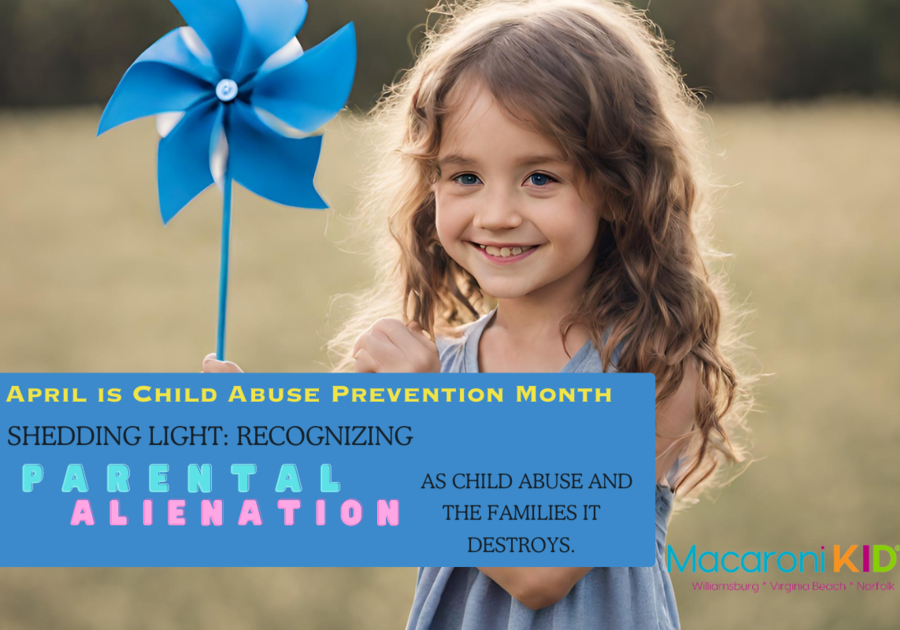In support of Child Abuse Prevention Month, Macaroni KID is delving into the heartbreaking issue of children abused by parental alienation. During April, we will explore the dynamics of parents who alienate their children from their other loving parents. We'll also shine a light on the role of our juvenile court system, “family” law attorneys, and Guardians et Litems are far too often implicated in unethical standards, perpetuating this cycle of abuse of children and fraud costing parents thousands of dollars in made-up fees, lies, and indiscretions, all while destroying families for profit.
Parental alienation is a distressing phenomenon that often goes unrecognized until its detrimental effects on children become glaringly apparent. It occurs when one parent systematically manipulates a child into unjustly rejecting the other parent, causing emotional harm and disrupting the child's relationship with the targeted parent. Recognizing the early signs of parental alienation is crucial in preventing further harm to the child and addressing the root cause of this form of abuse.
Join us as we uncover the truth behind these distressing realities that plague young children and their alienated parents.
Early Signs of Parental Alienation:
- Negative Comments and Blaming: A parent engaged in alienating behavior may consistently make disparaging remarks about the other parent in the presence of the child. They might blame the other parent for various problems or depict them as unworthy or incompetent.
- Interference with Communication: Restricting or monitoring the child's communication with the other parent through phone calls, messages, or visits can be a sign of alienation. This interference aims to limit the child's bond with the targeted parent.
- False Allegations: Fabricating or exaggerating claims of abuse or neglect against the other parent without evidence is a tactic commonly used in parental alienation. False allegations are intended to tarnish the targeted parent's reputation and credibility in the eyes of the child.
- Undermining Authority: The alienating parent may undermine the authority of the targeted parent by disregarding their rules and decisions, encouraging the child to defy their instructions, or allowing the child to disrespect them without consequences.
- Encouraging Rejection: Actively encouraging the child to reject or resist spending time with the other parent, especially during scheduled visitations, is a clear indication of parental alienation. The alienating parent may use manipulation or guilt-tripping to coerce the child into compliance.
The effects of parental alienation on children can be profound and long-lasting, affecting their emotional well-being, social relationships, and psychological development, causing a child extreme emotional distress. Children subjected to parental alienation often experience confusion, guilt, and loyalty conflicts. They may feel pressured to choose sides between their parents, leading to intense emotional distress and inner turmoil. Constant exposure to negative portrayals of one parent can erode the child's self-esteem and sense of identity. They may internalize the alienating parent's negative beliefs about the targeted parent, leading to feelings of inadequacy or self-doubt. Strained Relationships: Parental alienation can strain the child's relationships with the targeted parent causing said child to exhibit aggressive behavior due to unresolved anger and resentment.
Long-Term Psychological Effects of Parental Alienation Abuse
In severe cases, parental alienation can contribute to the development of anxiety disorders, depression, and other mental health issues in children. These effects will no doubt persist into adulthood, impacting their ability to form healthy relationships and navigate life challenges.
Parental Alienation is Child Abuse.
Parental alienation is increasingly recognized as a form of child abuse due to its detrimental effects on the child's well-being and development. By deliberately undermining the child's relationship with the targeted parent, the alienating parent inflicts emotional harm and deprives the child of a supportive and nurturing bond.
Moreover, parental alienation can perpetuate a cycle of dysfunction and conflict within families, leading to ongoing psychological harm for the child and exacerbating the animosity between parents. Legal experts and mental health professionals emphasize the need for early intervention and appropriate legal remedies to protect children from the harmful effects of parental alienation.
Identifying the early signs of parental alienation is essential for safeguarding the welfare of children and promoting healthy family dynamics. By raising awareness and addressing this form of abuse proactively, society can strive towards creating supportive environments where children can thrive emotionally and psychologically, free from the damaging effects of parental alienation.


